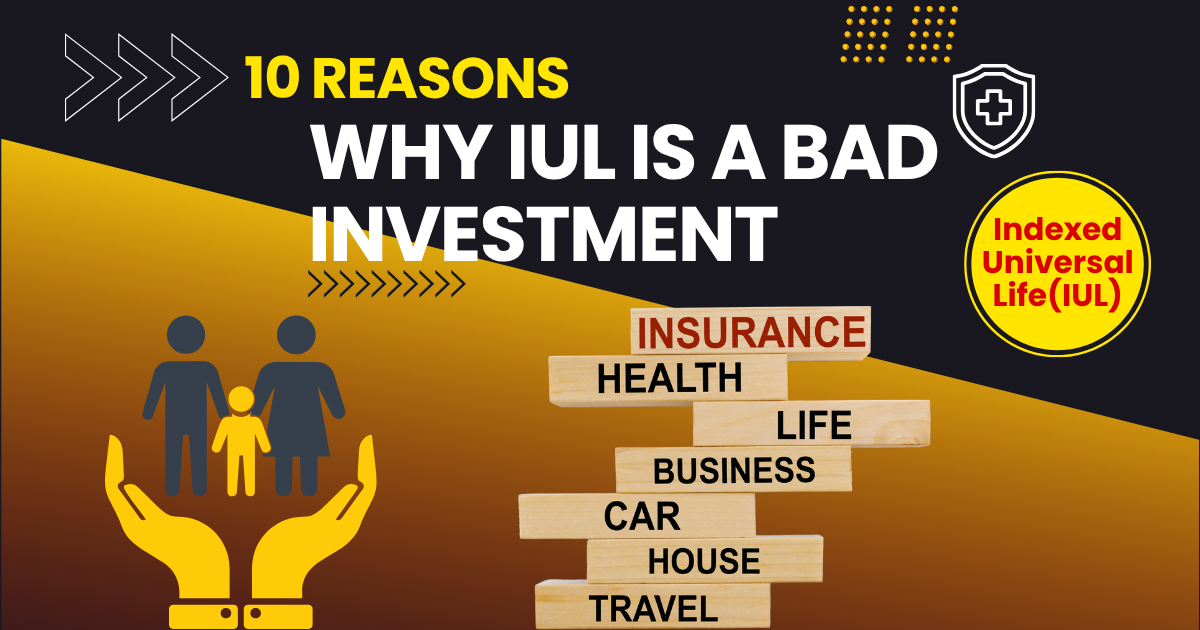What is Indexed Universal Life Insurance? Is It Really Worth It?
Are you thinking that an Indexed Universal Life (IUL) insurance policy might be a good way to spend your money?
You’re not alone.
Thousands of Americans are interested in IULs because they offer tax-free income, gains that are tied to the market, and protection for life. In theory, it seems like everyone would benefit. In practice, though, things are often very different. They are complicated, cost a lot, and have long-term risks.
In this article, we’ll explore the 10 reasons why IUL is a bad investment, especially for individuals looking to build wealth or secure their financial future.
If you are looking into different types of life insurance, this in-depth look will help you pick a wise decision.
1. High Fees and Hidden Costs
The fee system is one of the most negative things about IUL policies.
Advertisers often talk about the promise of tax-free growth, but they don’t talk about the policy’s high internal fees, which may include:
- Cost of insurance (COI)
- Staff fees
- Rider fees
- Costs of Managing funds
In the beginning, these fees may actually reduce your cash value. Some plans may never start to pay itself for 10 years or more.
For example: A $500 monthly fee are only earn $100 in cash value in the first year.
2. It’s Hard & Poor Clarity
Indexed Universal Life (IUL) policies are notoriously hard to understand compared to term or whole life insurance.
To understand how income is added, fees are taken and how insurance policy loans work, you need to know a lot about money. Too many clients don’t get all the details they need before they accept.
Finally, insurance companies often say they can change fees, responsibility rates, and cap rates whenever they want.
Lack of freedom can cause effects that aren’t planned and performance that isn’t good enough.
3. Market Prices Limit Your Returns
You don’t get the full market return with an IUL, when it is linked to the success of market indexes like the S&P 500.
Instead, you’re limited by:
- Cap Rates (e.g. You can only get a 10% return even if the stock market goes up 20%)
- Participation Rates (e.g. You might only get 80% of market profits)
- Spreads (e.g.changing returns by -1 to 2%)
In the long run, this makes it hard to really get rich.
Missed Opportunity: If the market grows 12% and your cap is 8%, you’re leaving money on the table.
4. Resigning Charges Are Costly
There are Resigning charges on most IUL plans that last for 10 to 15 years.
In other words, if you want to cancel the insurance early, you’ll have to pay a big fee, sometimes thousands of dollars.
Charging people with resigning is especially painful for people who:
- Experience financial hardship
- Change financial goals
- Find not to follow the rules.
5. Non-Guaranteed Proof
Agents often show pictures that show how much money will be made in the long run.
On the other hand, these pictures are not guaranteed. They’re based on fake rates and they don’t show how risky the market really is or how cap rates might change in the future.
Many clients are shocked to find that their real performance is not at all what they thought it would be.
Ask yourself: Do you want to put your money into an account that only had good plans?
6. Loans May Turn Wrong
The cash amount of an Indexed Universal Life (IUL) can be used without paying taxes, which is one of its best features.
But here’s what you can get:
- You have to pay interest on the loan
- The loan may be taxed by the IRS if it goes past due
- If you don’t pay it back, the insurance may get canceled
It’s also possible to lose insurance coverage if you spend too much.
7. There are other investments that are better
Easy and less expensive ways to make your money grow are:
- Roth IRAs (tax-free growth and withdrawals)
- 401(k)s with employer match
- Index funds with low fees
- Real estate
These options generally come with:
- Lower fees
- Even more freedom
- More cash flow
- Long-term Growth & Better Performance
Ask yourself: Why make your earnings more difficult when there are easier ways to do it?
8. Buying life insurance that you may not need
Indexed Universal Life (IUL) offer both life protection and investments. But what if you:
- Already have enough life insurance?
- Lack of long-term protection?
- Are you more interested in getting rich than in making a will?
In this case, you might do better to buy temporary protection and invest the extra money (also known as the BTID plan).
9. Too Much Focus on Tax-Free Growth
Yes, Indexed Universal Life (IUL) do offer tax-free policy loans and death benefits, but so do other plans like Roth IRAs and HSAs.
Moreover, policy fees and caps on gains often make the guarantee of tax-free income less attractive.
Don’t fall for the tax breaks alone. After fees and risks, you should always look at your final profits.
10. IULs Are Often Sold Wrong Way
Due to the high commissions—often up to 100% of your first year’s premium—many agents push Indexed Universal Life (IUL) hard.
Because of this, there may be an issue of interest where their income comes before yours.
In fact, many customers say they felt cheated when they bought an IUL and later found out how much it really cost.
11. Frequently Asked Questions (FAQs)
11.1. Is IUL a good investment for retirement?
Maybe not, Some agents sell IULs as a way to get tax-free income in the future, but they aren’t as good as Roth IRAs or 401(k)s because they have high fees and caps on profits.
11.2. Can you lose money in an IUL?
Yes. You’re protected against market losses, but over time, fees can eat away at your cash value, especially if you don’t put enough money into the insurance.
11.3. How much does an IUL usually earn?
Most IULs earn between 3% and 6% a year, which is a lot less than what you could make with a wide range of low-cost index fund investments.
11.4. Is there something better than IUL?
Of course. For more freedom, clarity, and growth potential, think about Roth IRAs, 401(k)s, real estate, or even high-yield savings accounts.
11.5. Why would you want an IUL?
IULs may be good for wealthy people who need to plan their estate in a complicated way, but they’re not usually the best choice for regular buyers.
Conclusion: If you want to buy an IUL, think carefully.
Indexed universal life insurance may sound like the best of the two options because it protects you against death and lets you spend your money. However, it hardly stands up to its promises on the financial front.
Indexed Universal Life (IUL) is not a good option for most people because it has high fees, few returns, difficult rules, and agents who are trying to defraud you.
Take a step back and look at better options before you make a decision. Your financial future should be simple, not hard to understand.
Ready to Make Smarter Choices?
Maybe you should talk to a fee-only financial expert. They can help you find the right term insurance and low-cost investment plans for your needs without the forced sales offer.


